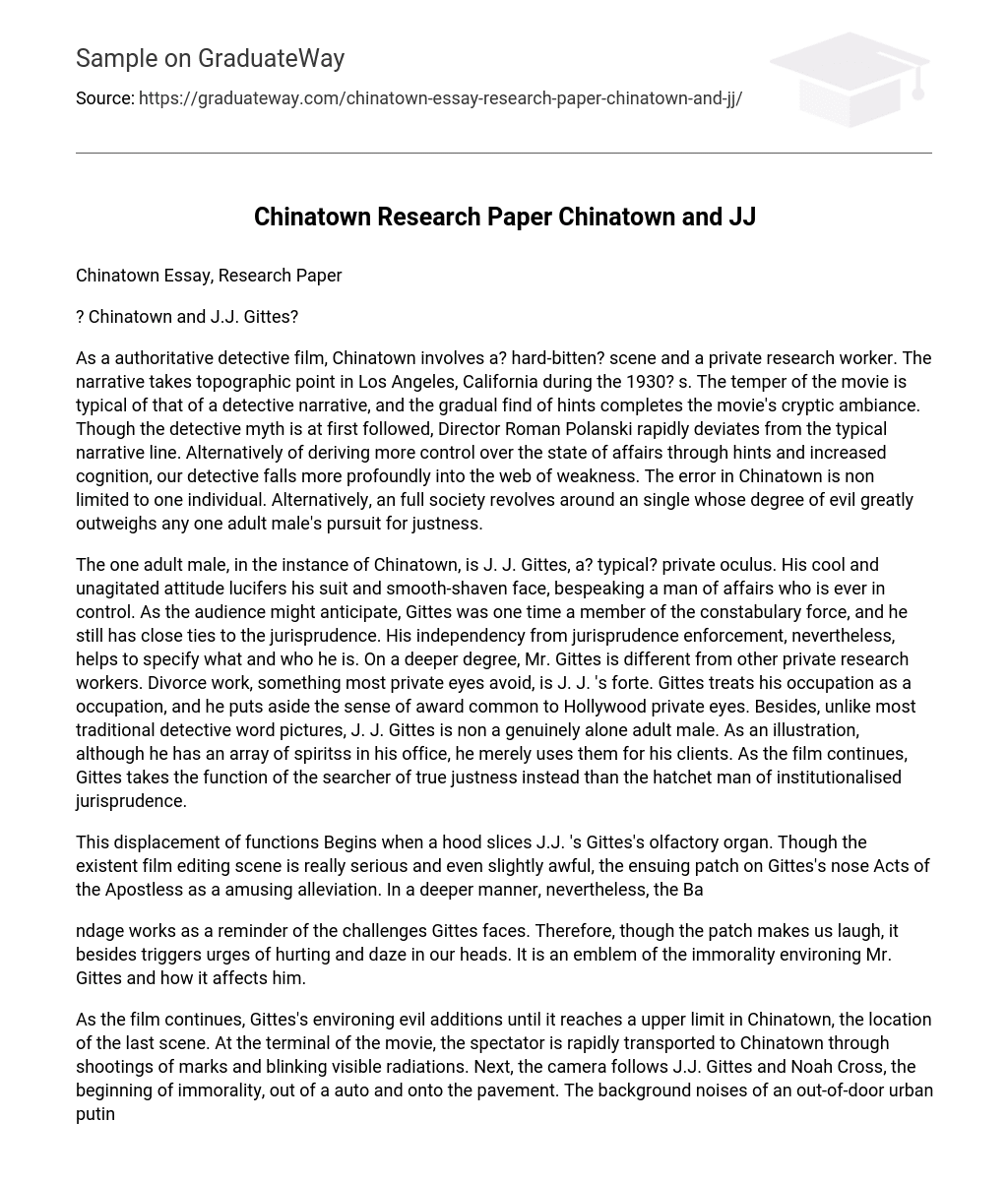As a authoritative detective film, Chinatown involves a? hard-bitten? scene and a private research worker. The narrative takes topographic point in Los Angeles, California during the 1930? s. The temper of the movie is typical of that of a detective narrative, and the gradual find of hints completes the movie’s cryptic ambiance. Though the detective myth is at first followed, Director Roman Polanski rapidly deviates from the typical narrative line. Alternatively of deriving more control over the state of affairs through hints and increased cognition, our detective falls more profoundly into the web of weakness. The error in Chinatown is non limited to one individual. Alternatively, an full society revolves around an single whose degree of evil greatly outweighs any one adult male’s pursuit for justness.
The one adult male, in the instance of Chinatown, is J. J. Gittes, a? typical? private oculus. His cool and unagitated attitude lucifers his suit and smooth-shaven face, bespeaking a man of affairs who is ever in control. As the audience might anticipate, Gittes was one time a member of the constabulary force, and he still has close ties to the jurisprudence. His independency from jurisprudence enforcement, nevertheless, helps to specify what and who he is. On a deeper degree, Mr. Gittes is different from other private research workers. Divorce work, something most private eyes avoid, is J. J. ‘s forte. Gittes treats his occupation as a occupation, and he puts aside the sense of award common to Hollywood private eyes. Besides, unlike most traditional detective word pictures, J. J. Gittes is non a genuinely alone adult male. As an illustration, although he has an array of spiritss in his office, he merely uses them for his clients. As the film continues, Gittes takes the function of the searcher of true justness instead than the hatchet man of institutionalised jurisprudence.
This displacement of functions Begins when a hood slices J.J. ‘s Gittes’s olfactory organ. Though the existent film editing scene is really serious and even slightly awful, the ensuing patch on Gittes’s nose Acts of the Apostless as a amusing alleviation. In a deeper manner, nevertheless, the Ba
ndage works as a reminder of the challenges Gittes faces. Therefore, though the patch makes us laugh, it besides triggers urges of hurting and daze in our heads. It is an emblem of the immorality environing Mr. Gittes and how it affects him.
As the film continues, Gittes’s environing evil additions until it reaches a upper limit in Chinatown, the location of the last scene. At the terminal of the movie, the spectator is rapidly transported to Chinatown through shootings of marks and blinking visible radiations. Next, the camera follows J.J. Gittes and Noah Cross, the beginning of immorality, out of a auto and onto the pavement. The background noises of an out-of-door urban puting create a deformation as Gittes is confronted by a former chap constabulary officer. At this point, the arrangement of Gittes and Cross on the screen, compounded by the coincident statements of both work forces, suggests struggle to the spectator. Following, as the lieutenant tells another officer to lock Gittes to the maneuvering wheel of his auto for? keep backing grounds, ? the camera follows Cross to his girl, Mrs. Mulwray. What follows is an up-close battle between Cross and Mrs. Mulwray. It ends with a gunfire to Cross’s arm and a wide-screen position of Mrs. Mulwray rushing off in her auto. In the terminal, the spectator sees a dead Mrs. Mulwray and a screaming daughter/sister. Finally, Gittes is taken off from the camera as a crowd of witnesss covers the screen.
I agree with Cawelti’s position of Chinatown. Indeed, the film is a strong illustration of how traditional myth crumbles with the presence of a greater immorality. The myth of a detective narrative is one that developed chiefly within the earlier old ages of movie. It typically involves a hero, in the signifier of a investigator, on a mission. The hero is balanced on the? border of the law. ? He uses both his intuition and his brushs with immorality to detect the beginning of error. Finally, the hero finds an single responsible for the error, and the felon is brought to justness. In Chinatown, nevertheless, seeking for justness leads merely to failure, and in the terminal, our hero is destroyed.





